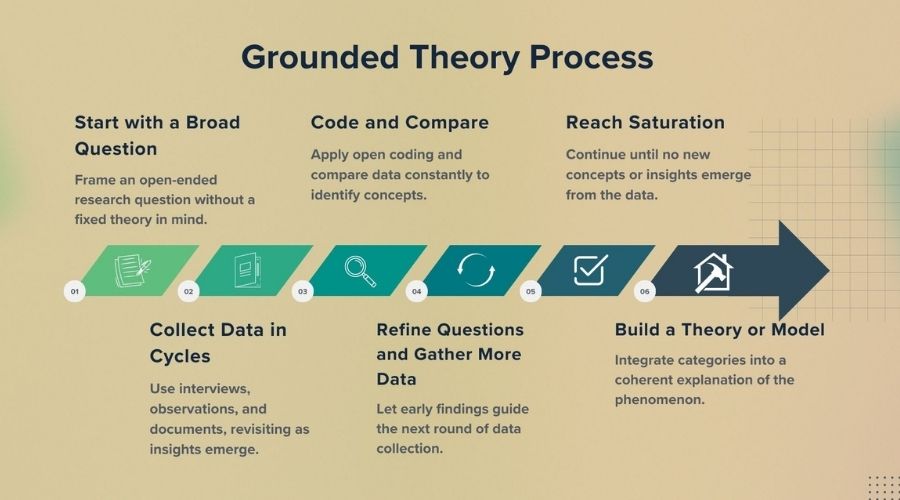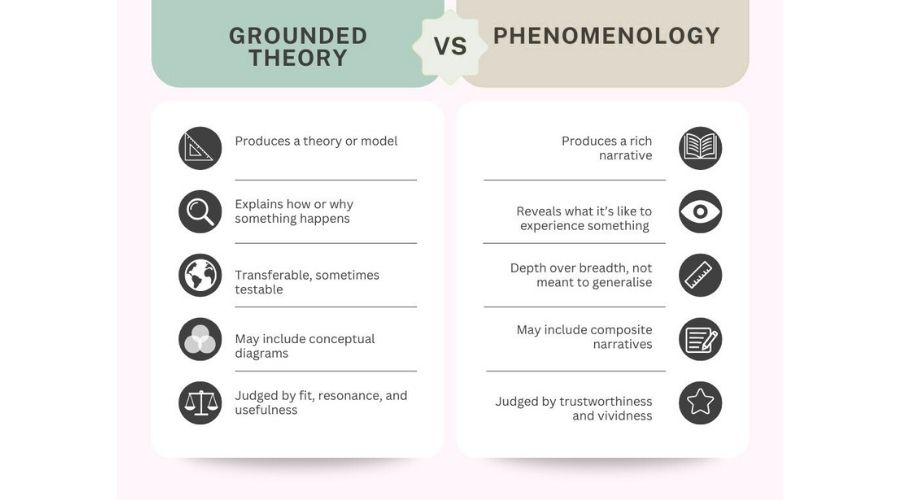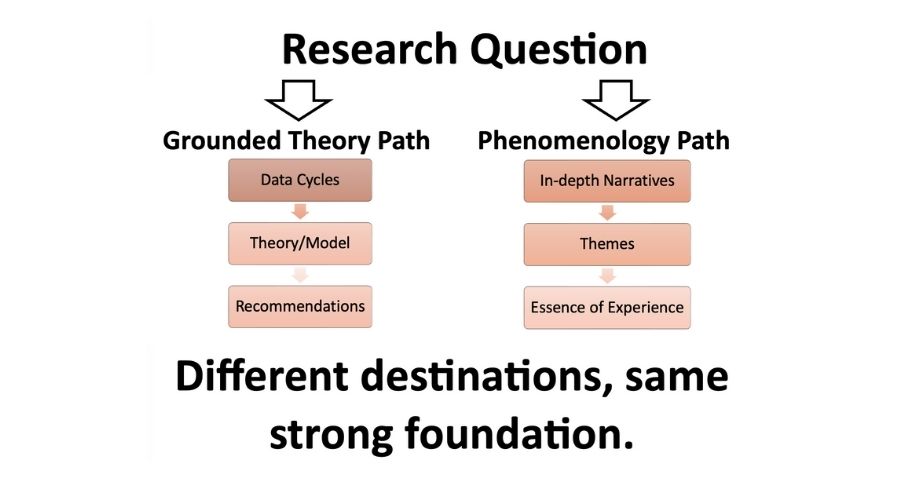
Choosing between grounded theory vs phenomenology can be challenging for students doing a qualitative study. On the one hand, both are among the most widely used qualitative research methodologies.
On the other hand, they serve very different purposes that result in very distinct findings.
In this article, we present a side-by-side comparison to help you understand these differences. Specifically, we will highlight why it’s aligning your chosen method with your research question is important for research success.
More importantly, we’ll explain how an essay writing service can provide expert guidance to help you choose the right method, develop a strong methodology chapter, or analyse qualitative data with confidence.
Grounded Theory vs Phenomenology: Theory and Philosophy
What are the theory and philosophy of grounded theory?
Grounded theory is fundamentally inductive and iterative, designed to build new theories directly from data rather than test existing ones. Developed in the 1960s by researchers, Barney Glaser and Anselm Strauss, it emerged as a response to the dominance of quantitative research, offering a credible way to create theoretical models grounded in empirical observations.
Its roots in sociology, particularly symbolic interactionism, reflect its focus on social processes. Researchers often start without a pre-set framework, which lets patterns and categories emerge naturally from participant data. The researcher’s ability to notice subtle cues and refine questions along the way is central.
The ultimate goal is an explanatory theory of how and why something occurs in a social context, constructed from the ground up.
What are the theory and philosophy of phenomenology?
Phenomenology, in contrast, is rooted in philosophy and the search for meaning. Originating in early 20th-century Europe, it was shaped by thinkers like Edmund Husserl, Martin Heidegger, and Paul Ricoeur.
As a research method, phenomenology seeks to explore and describe the essence of lived experiences. It assumes reality is subjective, meaning is socially constructed, and the researcher is part of the world being studied.
Its key practice is “bracketing”, or setting aside preconceptions, which allows the phenomenon to be understood through participants’ perspectives. Thus, rather than producing a theory, phenomenology aims to reveal the structure and meaning of an experience.

Methodology: How Each Approach Works
Let’s look at how each method actually works so you can picture yourself applying it in your study.
Methodology of Grounded Theory
Grounded Theory uses a systematic yet flexible process of collecting and analysing data. You typically start with broad questions and gather data, using interviews, observations, or documents, in cycles.
Here’s the key: analysis starts immediately, using what’s called the constant comparative method. Early interviews are coded line-by-line to spot concepts, which then guide what you ask next.
This iterative process continues until you reach “saturation,” when no new insights are emerging. Coding usually moves in stages: open coding (labeling concepts in participants’ own words), axial coding (linking related categories), and selective coding (integrating them into a coherent theory).
Throughout, you avoid forcing existing theories. Rather, you let the data speak. Because this approach is so detailed, expect to collect a substantial amount of data, around 20–30 interviews, to build a well-supported theory.

Methodology of Phenomenology
Phenomenology, in contrast, is more focused and reflective, aiming to uncover the essence of lived experiences. You usually work with a small, purposive sample, around 5–15 participants, and may also use personal writings or other materials that capture the experience.
Analysis here means immersing yourself in the data: reading transcripts repeatedly, identifying “meaning units” (key phrases or passages), and clustering these into broader themes.
Your goal isn’t to explain cause and effect but to paint a rich, accurate picture of what the experience means to participants. Remember, reflexivity is central here, so you set aside personal assumptions as much as possible to truly see the phenomenon through their eyes.

Research Outcomes and Deliverables
Grounded theory gives you a framework to explain; phenomenology gives you a window to understand.

If you choose grounded theory, your final product is, as the name suggests, a theory or model. This is a set of interrelated concepts explaining a process, action, or interaction. For example, you might develop a theory of how parents cope with a child’s chronic illness—identifying core categories like Seeking Support or Reframing the Situation and showing how these relate.
A strong grounded theory doesn’t just list themes; it tells a coherent story and often includes a conceptual model or diagram. Theories are meant to be transferable and sometimes testable, and they often suggest practical recommendations.
Because it yields a theoretical framework, grounded theory is especially valuable when no existing theory adequately explains a phenomenon. Its quality is judged by how well it fits the data, resonates with participants, and informs further research or practice.
Phenomenology Outcomes
In contrast, phenomenology delivers an in-depth, descriptive insight into people’s lived experiences. The result is typically a set of themes and a narrative that together capture the essence of the phenomenon.
For instance, a study on students’ experiences of online learning might reveal themes like isolation and connection, adaptive learning journey, and struggles with self-motivation.
Here, the emphasis is on depth over breadth. Phenomenology doesn’t aim to generalise findings but to present an accurate, vivid account of the experience.
The outcome might take the form of a composite narrative, allowing readers to almost “walk in the participants’ shoes.” Its success is judged by trustworthiness and richness: Does it reflect participants’ realities and offer meaningful insight?

Cases and Practical Examples
Choosing between grounded theory and phenomenology depends largely on your research question and objectives. Here are some practical scenarios to help you decide which approach fits best.
Use grounded theory if your aim is to uncover processes, explanations, or to develop new theory.
- If you want to understand how or why something happens to formulate a theory.
Example: “How do first-generation college students develop resilience during their first year?”—interview many students to derive a theory of resilience-building. - If there are or no existing models on the topic.
Example: “How do remote workers establish work-life balance in virtual teams?”—build a model explaining strategies and influencing factors. - If you’re using words like “process,” “develop,” or “explanation of…”
Example: “What is the process by which community health clinics adapt to policy changes?” - If you have larger samples (about 20–30 interviews) to reach saturation; be ready for iterative collection and coding.
- If you are in sociology, education, nursing, and organisational studies—e.g., policy implementation, group dynamics, or technology adoption.

Use phenomenology if your goal is to understand the lived experience or meaning of a phenomenon from participants’ perspectives.
- If you want to explore the essence of an experience.
Example: “What is the lived experience of overcoming cyberbullying as a teenager?”—capture feelings of isolation, support-seeking, and growth. - If your questions start with “What is it like…” or “How do people experience…”
Example: “How do hospice nurses find meaning in end-of-life care for patients?” - If you’re working with small, purposive samples (5–10 interviews) for detailed narratives.
- If you’re comfortable with narrative data and reflective analysis; bracketing personal bias is essential.
- If you’re in the fields of psychology, health, nursing, and education—especially for sensitive, personal, or poorly understood experiences (e.g., cultural identity, burnout).

Some questions could be tackled by either method but would yield different results.
For instance: “How do parents cope with having a child with autism?”
- Grounded theory is used to develop a coping-process model.
- Phenomenology is used to describe what coping feels like, capturing emotional depth.
In the end, the right choice depends on what you need to discover. If you’re unsure, a mentor or research writing service can help you decide.
Aligning Method with Your Research Question
A crucial principle in research design is that the research question should drive the choice of method, not the other way around. As several experts note, the question “What is the best research method?” is incomplete. Instead, you should ask, “What is the best method for answering my particular research question most effectively?”

Grounded theory vs. phenomenology is not about which is “better” overall. Instead, it’s about which best serves your study’s purpose. Here are key tips to ensure proper alignment:
- Examine the wording of your research question. If your question implies exploration of meaning or experience (e.g., “What is the experience of…?” or “How do people perceive…?”), it leans toward phenomenology. If it implies developing a conceptual explanation or process (e.g., “What explains…?” or “How does X process unfold?”), it leans toward grounded theory.
- Consider the end goal. Do you want to produce a theory/model (grounded theory) or a deep understanding (phenomenology)? Match this to what your academic field expects and what you personally find most engaging.
- Match methodology to the nature of the phenomenon. Ongoing social processes, like team interactions, may benefit from grounded theory. Deeply personal or intense experiences, like undergoing a rite of passage, fit well with phenomenology.
- Be pragmatic, but clear. While some researchers combine elements or choose after exploration, as a student, it’s best to commit early. Choose an approach whose philosophical assumptions you can stand behind in writing.
- Seek guidance. If uncertain, consult mentors or use a professional research writing service. Expert input can prevent mismatches that lead to weak findings or analysis challenges.
In short, always circle back to: “What do I want to know, and which approach will best get me that knowledge?” That clarity will make the rest of your project far more coherent and manageable.
Ethical Considerations in Qualitative Research
Given that qualitative research often explores personal, sensitive domains and both grounded theory and phenomenology involve close engagement with participants, ethical rigour is a must.
- Ensure participants fully understand the study, the kinds of questions or activities involved, and that they can withdraw at any time. Clearly explain your purpose in accessible terms and obtain written consent.
- Protect participants’ identities by using pseudonyms or codes and masking identifying details. Be alert to the fact that detailed stories can sometimes inadvertently reveal who they are.
- Be prepared for emotional reactions when studies involve deeply personal experiences. Conduct interviews respectfully and be ready to pause or stop if distress occurs. Offer resources, such as counseling contacts, when sensitive topics are discussed.
- Remember that your presence influences the data. Be aware of power dynamics and create a safe, non-judgmental environment. In phenomenology, bracket assumptions; in grounded theory, avoid forcing data into preconceived codes. Use member-checking to ensure you’ve represented views accurately.
- Store recordings, transcripts, and notes securely. If you change your approach based on early findings, make sure it remains within the scope of participant consent. Maintain an audit trail for transparency.
- Seek Institutional Review Board (IRB) or ethics committee approval before starting. Be culturally sensitive. Learn appropriate behaviours, avoid taboos, and involve community representatives when necessary.
- Be transparent about your methods and limitations. Avoid sensationalising or overgeneralising findings, and always credit participants and sources accurately.

Anticipate these issues to protect the participants’ rights and dignity. Remember that ethical research is not just about avoiding harm. More importantly, it’s about showing respect for people’s privacy, voices, and experiences.
How an Essay Writing Paper Service Can Support Your Grounded Theory/Phenomenological Study
Designing and conducting a qualitative study can be challenging, especially if you’re new to these methods. This is where a professional essay writing service can make a real difference.
- If you’re torn between grounded theory and phenomenology, experienced consultants can review your aims and questions to advise on the best fit. They can guide you with the best method to select. This saves time and prevents costly misalignment.
- They can help you find and summarise credible sources, ensuring your proposal and literature review have a solid theoretical foundation with the right references.
- Many students struggle with methodology and chapter development. A service can help you clearly describe your research design, sampling, data collection, and analysis, using precise academic language.
- Data analysis and coding of qualitative data are taxing. So, whether you need guidance with grounded theory coding stages or phenomenological theme development, they can help you stay true to the chosen method and even assist with NVivo or ti.
- They ensure quality review and editing. They can ensure your findings align with your research question, your discussion reflects your methodology, and your final paper is polished, coherent, and correctly cited.
- They can remind you to always align with ethical and validity checks, such as anonymising data, documenting IRB processes, and using member checking to strengthen credibility.

An essay writing paper service is like having a guide on your side. You won’t break academic integrity because you’re still doing the research anyway. However, you’re assured that you’re aided in choosing the correct methods, refining chapters, and polishing your paper.
Your stress is reduced, and your confidence is boosted for a more rewarding academic journey.
In Summary
Grounded theory and phenomenology are both strong qualitative approaches, each with distinct strengths. Grounded theory focuses on building new theories and explaining processes, while phenomenology aims to capture the depth and meaning of lived experiences.
The key is to choose the method that best matches your research question and personal style.
Ask yourself: Do you want to explain how something works, or understand what it feels like?
And remember, you don’t have to do this alone. A professional essay writing service can guide you at any stage, helping you produce a rigorous, well-structured, and ethically sound qualitative study.
0 Comments
Leave a reply
You must be logged in to post a comment.


